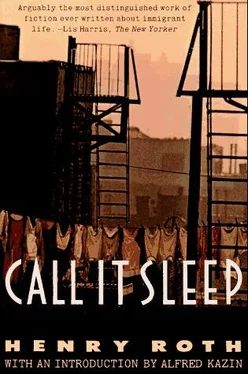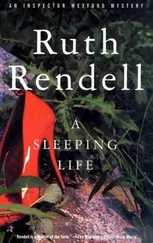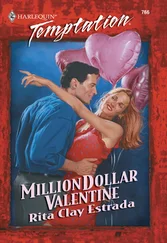“An’ wattayuh t’ink he had de crust to tell me?” A man with a raw, weathered face was speaking, smoke from his cigarette unwreathing his words. “He siz, wadjuh stop fer? Now wouldn’t dat give yuh de shits?”
He stared at the others for affirmation. They nodded agreement with their eyes.
Vindicated, the man continued, but more slowly and with greater emphasis. “His pole smacks into my hack, and he squawks wadjuh stop fer? I coulda spit in his mug, de donkey!”
“At’s twiset now, ain’ it?” asked another.
“Twiset, my pudd’n,” retorted the first in wrathful contempt. “It’s de toid time. Wuzn’t Jeff de foist one he rammed, an’ wuzn’t Toiner de secon’? An’ yestiddy me!”
“Hey!” Another man nudged his neighbor abruptly. “Dere goes de row-boat!”
Hastily throwing their cigarettes away, they scattered, and each one swung himself up to his box on the carriage.
More confused now than before, David drew near the doorway. A man in a tall black hat had just come out and was standing on the step looking solicitously into the hallway. A hush fell on the crowd; they huddled together as if for protection. Terror seemed to emanate from the hallway. At a sign from the man in the tall hat, the doors in back of the strange carriage were thrown open. Inside the gloomy interior metal glimmered, tasseled curtains shut out the light. Suddenly out of the hallway a scraping sound and slow shuffling of feet. A soft moan came from the crowd.
“He’s coming!” someone whispered, craning her neck.
A sense of desolation. A fear.
Two men came out, laboring under the front-end of a huge black box, then two more at the other end. Red-faced, they trod carefully down the steps, advanced toward the carriage, rested one end of the box on the carriage floor.
That was—! Yes! That was! He suddenly understood. Mama said — Inside! Yes! Man! Inside! His flesh went cold with terror.
“Easy,” cautioned the man in the black hat.
They shoved the box in, lunging after it. It squealed softly, sliding in without effort as if on ways or wheels. The man who had opened the doors, shot a large silvered pin into a hole behind the box, then in one skilful motion shut the doors. At a nod from the man in the black hat, the carriage rolled on a little distance, then stopped. Another carriage drew up before the house.
Supported by a man on either side of her, a woman in black, all bowed and veiled, came sobbing out of the house. The crowd murmured, a woman whimpered. David had never seen a handkerchief with a black border. Hers seemed white as snow.
Voices of children. He looked around.
Annie and Yussie were there, staring at the woman as she entered the carriage. He shuddered, contracting, crept behind the crowd and broke into a run.
At the doorway of his house he stopped, peered in, stepped back. What was he going to do now? At lunch time, as he neared the house, he had seen Mrs. Nerrick, the landlady, climb up the stoop. By running frantically, he had caught up to her, had raced past the cellar, before she shut her door. But now there was no one in sight. At any moment Annie and Yussie might come round the corner. He must — before they saw — but the darkness, the door, the darkness. The man in the box in the carriage. Alone. He must.
Make a noise. Noise … He advanced. What? Noise. Any.
“Aaaaah! Ooooh!” he quavered, “My country ’tis of dee!” He began running. The cellar door. Louder. “Sweet land of liberty,” he shrilled, and whirled toward the stairs. “Of dee I sing.” His voice rose in a shriek. His feet pounded on the stair. At his back, the monstrous horde of fear. “Land where our fodders died!” The landing; he dove for the door, flinging himself upon it — Threw it open, slammed it shut, and stood there panting in terror.
His mother was standing, staring at him in wide-eyed amazement. “Was that you?”
Close to tears, he lowered his head.
“What is it?”
“I don’t know,” he whimpered.
She laughed hopelessly and sat down. “Come here, you strange child. Come here. You’re white!”
David went over and sank against her breast.
“You’re trembling,” she stroked his hair.
“I’m afraid,” he murmured against her throat.
“Still afraid?” she said soothingly. “Still the dream pursuing you?”
“Yes,” a dry sob shook him. “And something else.”
“What else?” She pressed him toward her with an encircling arm. In the other hand, she took both of his. “What?” she murmured. Her lips’ soft pressure against his temples seemed to sink inward, downward, radiating a calm and a sweetness that only his body could grasp. “What else?”
“I saw a — a man who was in a box. You told me once.”
“What? Oh!” her puzzled face cleared. “A funeral. God grant us life. Where was it?”
“Around the corner.”
“And that frightened you?”
“Yes. And the hall was dark.”
“I understand.”
“Will you wait in the hall if I call you next time?”
“Yes. I’ll wait as often as you like.”
David heaved a quivering sigh of relief and kissed her cheek in gratitude.
“If I didn’t,” she laughed, “Mrs. Nerrick, the landlady, would dispossess us. I never heard such a thunder of feet!” When she had unbuttoned his leggings she rose and set him in a chair. “Sit there, darling. It’s Friday, I have so much to do.”
For a while, David sat still and watched her, feeling his heart grow quiet again, then turned and looked out of the window. A fine rain had begun to fall, serrying the windows with aimless ranks. In the yard the snow under the rain was beginning to turn from white to grey. Blue smoke beat down, strove upward, was gone. Now and then, the old house creaked when the wind elbowed in and out the alley. Borne through mist and rain from some remote river, a boat horn boomed, set up strange reverberations in the heart …
Friday. Rain. The end of school. He could stay home now, stay home and do nothing, stay near his mother the whole afternoon. He turned from the window and regarded her. She was seated before the table paring beets. The first cut into a beet was like lifting a lid from a tiny stove. Sudden purple under the peel; her hands were stained with it. Above her blue and white checkered apron her face bent down, intent upon her work, her lips pressed gravely together. He loved her. He was happy again.
His eyes roamed about the kitchen: the confusion of Friday afternoons. Pots on the stove, parings in the sink, flour smeared on the rolling pin, the board. The air was warm, twined with many odors. His mother rose, washed the beets, drained them, set them aside.
“There!” she said. “I can begin cleaning again.”
She cleared the table, washed what dishes were soiled, emptied out the peelings that cluttered the sink into the garbage can. Then she got down on all fours and began to mop the floor. With knees drawn up, David watched her wipe the linoleum beneath his chair. The shadow between her breasts, how deep! How far it — No! No! Luter! When he looked! That night! Mustn’t! Mustn’t! Look away! Quick! Look at — look at the linoleum there, how it glistened under a thin film of water.
“Now you’ll have to sit there till it dries,” she cautioned him, straightening up and brushing back the few wisps of hair that had fallen over her cheek. “It will only be a few minutes.” She stooped, walked backward to the steps, trailing the mop over her footprints, then went into the frontroom.
Left alone, he became despondent again. His thoughts returned to Luter. He would come again this evening. Why? Why didn’t he go away. Would they have to run away every Thursday? Go to Yussie’s house? Would he have to play with Annie again? He didn’t want to. He never wanted to see her again. And he would have to. The way he did this afternoon beside the carriages. The black carriage with the window. Scared. The long box. Scared. The cellar. No! No!
Читать дальше












